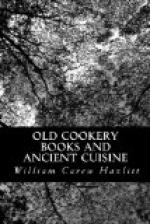16. The Queen’s Closet opened. Incomparable secrets in physick, chirurgery, Preserving, Candying, and Cookery.... Transcribed from the true copies of her Majesties own Receipt Books. By W.M., one of her late Servants.... London, 1655, 8vo. The same, corrected and revised, with many new and large Additions. 8vo, 1683.
17. The Perfect Cook: being the most exact directions for the making all kinds of pastes, with the perfect way teaching how to raise, season, and make all sorts of pies.... As also the Perfect English Cook.... To which is added the way of dressing all manner of Flesh. By M. Marmette. London, 1686, 12mo.
The writer of the “French Gardener,” of which I have had occasion to say a good deal in my small volume on that subject, also produced, “Les Delices de la Campagne,” which Evelyn excused himself from translating because, whatever experience he had in the garden, he had none, he says, in the shambles; and it was for those who affected such matters to get it done, but not by him who did the “French Cook” [Footnote: I have not seen this book, nor is it under that title in the catalogue of the British Museum]. He seems to imply that the latter, though an excellent work in its way, had not only been marred in the translation, but was not so practically advantageous to us as it might have been, “for want of skill in the kitchen”—in other words, an evil, which still prevails, was then appreciated by intelligent observers—the English cook did not understand her business, and the English mistress, as a rule, was equally ignorant.
One of the engravings in the “French Gardener” represents women rolling out paste, preparing vegetables, and boiling conserves.
There is a rather quaint and attractive class of miscellaneous receipt-books, not made so on account of any particular merit in their contents, but by reason of their association with some person of quality. MS. Sloane 1367, is a narrow octavo volume, for instance, containing “My Lady Rennelagh’s choice Receipts: as also some of Capt. Gvilt’s, who valued them above gold.” The value for us, however, is solely in the link with a noble family and the little touch about the Captain. There are many more such in public and private libraries, and they are often mere transcripts from printed works—select assemblages of directions for dressing food and curing diseases, formed for domestic reference before the advent of Dr. Buchan, and Mrs. Glasse, and Mrs. Rundell.
Among a valuable and extensive assemblage of English and foreign cookery books in the Patent Office Library, Mr. Ordish has obligingly pointed out to me a curious 4to MS., on the cover of which occurs, “Mrs. Mary Dacres her booke, 1666.”




